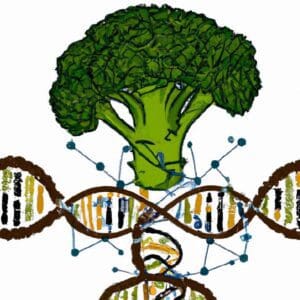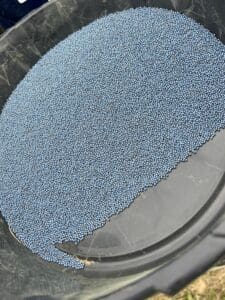
Is broccoli man made? Is it a GMO? These are questions we often hear at Smith’s Farm. Many vegetables are misunderstood to be genetically modified organism (GMO) plants. Currently, there are no GMO varieties of broccoli. Broccoli is the result of centuries of selective breeding. Selective breeding is a process in which farmers choose plants with desirable traits and breed them together to produce offspring with those traits. This process can span many generations to carry out beneficial outcomes.
Broccoli is part of the Brassica oleracea vegetable species.
Broccoli is part of the Brassica oleracea vegetable species. It is a member of the Brassica genus, which also includes:
-
- Brussels sprouts
A GMO is an organism whose DNA has been changed.
GMO plants are not created through selective breeding. A genetically modified crop is a crop that has had its genetic makeup altered using genetic engineering to produce a more desirable outcome, such as resistance to disease or changing its size. The genetic engineering process of altering plant characteristics with genetic modifications is much more specific, and faster.
Modification of plant traits by genetic modification is a recent development in the history of agriculture – used mostly in the last 25 years. While modern broccoli is technically a “man-made vegetable”, the varieties were grown by the traditional method of selective breeding varieties for a desired combination of traits.
Breeding and GMOs (Genetically Modified Organism) have the same goals and different results.
Selective breeding methods of trait modification are done by cross-breeding two different plants. Each plant will have desirable traits, generating offspring with desirable characteristics. This approach can take years or even decades to produce a suitable result. Breeding is much slower than gene-splicing methods, like genetic modification, because it requires time to grow new plants and breed them over several generations. In addition, it also means that you may end up with many more unwanted seeds (i.e., “mutations”) along the way. Even though these mutations may be more prevalent than with genetic modifications, these “mutations” can still produce useful unintended outcomes!
Similarly, the goal of GMOs is to alter a specific aspect of a crop. The gene associated with the particular trait, for example, chemical or pest resistance, is isolated and manipulated to add or subtract a specific trait specifically. The advantage of this precision is that plants can be altered quickly and without unexpected crossbreeding outcomes. At this point, broccoli has not undergone this kind of alteration. Other crops like Alfalfa and Corn have GMO varieties that make the plants more durable and likely to thrive. There is nothing about genetic modification that is less organic than selective breeding – it is merely more precise and more efficient. GMOs are a prime example of modernization in agriculture and the advancement of a centuries-old practice.

What Does This Mean for Broccoli?
So, where did broccoli come from? Broccoli is a descendant of the wild cabbage plant, which is native to the Mediterranean region. Over the years, farmers selectively bred wild cabbage plants to produce various cruciferous vegetables, including broccoli.
One of the main reasons broccoli was bred was for its high nutritional value. It is an excellent source of vitamins C and K, as well as dietary fiber and other important nutrients. In addition to being healthy, broccoli was also bred for its flavor and texture, which is why it is a popular vegetable in many dishes today.
Are Selective Breeding and GMO’s Sustainable Agriculture?

Selective breeding is a natural and sustainable way of improving plants, and it has been used for centuries to create many of the foods we enjoy today. Broccoli is just one example of a plant that has been successfully bred through this process. Smith’s Farm is always exploring seed varieties that are being developed to help growers tackle relevant issues like heat resistance and seasonality. From a crop management standpoint, this is very sustainable as it allows crops to adapt and change with the environment.
GMOs are also important in sustainability. Many of the traits adapted by GMOs allow for plants to thrive with less consumption of natural resources, like water. This type of modification can make the plants more drought-resistant. Also, some GMOs are created to make plants more pest-resistant. This reduces the need for chemical applications for pest management on crops. Selective breeding and GMOs are examples of how modern agriculture continues to evolve to make farming more efficient and sustainable.
Is Broccoli Man Made?
Finally, while broccoli is not a genetically modified organism (GMO), it is technically a man-made vegetable due to centuries of selective breeding. Despite the ever-evolving landscape of agriculture, Smith’s Farm remains committed to ensuring that the seeds we use to grow broccoli crops yield the most flavorful, resilient, and natural products. Cheers to the science of agriculture in all its diverse forms! Finally, we spend most of our time talking about human consumption of produce. Have you ever wondered, “Is broccoli is good for dogs?” Who better to answer that question than us!

